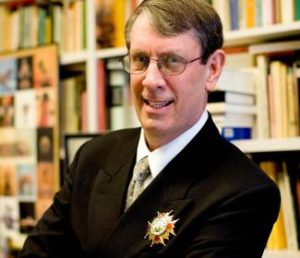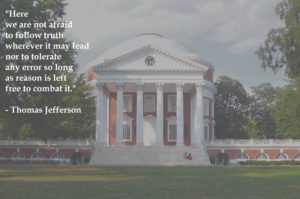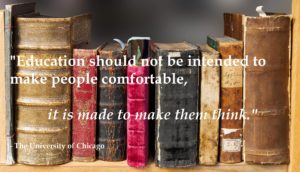Musings on Free Speech in Higher Education
Written by David T. Gies, Commonwealth Professor of Spanish, College and Graduate School of Arts and Sciences; Editor of DIECIOCHO; Corresponding Member of the Spanish Royal Academy
Last year, I announced my retirement from UVA, effective May 2018. Yes, I know that I am now merely a statistic, one of dozens of senior scholars and teachers my age who are choosing to move away from The Lawn. The decision encourages me to reflect on the many (38) years I have had the privilege of laboring at Mr. Jefferson’s University. All of the clichés you normally hear are true: it’s a great place to work, the students are terrific, the vision is exciting, the colleagues and staff are supportive, and —in case you haven’t noticed— the place is dazzlingly gorgeous.
I worry, however, about some trends we detect in higher ed today. These are movements that encourage students (and their parents) to dismiss the media as Fake News, that censor or ban controversial speakers (whether they come from the left or the right), that attempt to protect students from “discomfort” or from being “offended” in the classroom, or that close down discussions because the topic is deemed to be too provocative or sensitive or troubling. We read examples of such behaviors and concerns daily, not only in the mainstream media, but also in professional publications such as The Chronicle of Higher Education or Inside Higher Ed.
I teach in the Department of Spanish, Italian, and Portuguese, which is housed in the newly-renovated New Cabell Hall. Emblazoned on the wall of the building are Mr. Jefferson’s prescient words, “Here we are not afraid to follow truth wherever it may lead nor to tolerate any error so long as reason is left free to combat it.” In keeping with that spirit, on the door of my office I have posted a statement from the University of Chicago that suggests, “Education should not be intended to make people comfortable, it is made to make them think.” I believe this is a fundamental truth of education as a whole, and of higher education in particular. We, as thinking and educated adults, need to open ourselves to “the other” and to debate, argue against and challenge ideas that make us uncomfortable. Indeed, I would suggest that this is the only way to grow intellectually. If we do not expose ourselves to ideas that make us uncomfortable or that challenge us, we remain mired in a self-limiting circle of sameness. I think Mr. Jefferson believed that as well.
What is the line between protecting ourselves from offensive (even disgusting) ideas and censorship? When does free speech become merely free speech for ME and for those who believe what I believe?
These comments might be read as the musings of an out-dated, cranky, old, and (almost) retired professor. (I might be forced to confess to at least some of these designations). Yet, free thinking and free speech are the absolute bedrocks of education, and I would urge us all —parents, students, professors, and administrators— not to legislate too restrictively the sensitivities of others. If you disagree with something, then discuss it, read about it, inform yourself, marshal your arguments, convince your interlocutor, and lay out your own ideas in a compelling manner. You will be stronger for it, not weaker.
Let your reason make you free.
Or, if all else fails, call your mother.
- Making the Promise Real: How a UN Tax Convention Can Fulfill the UNDHR’s Vision
- Having a Drink With Your Donkey: The Absurd in Antiquity
- What Happens to UVA’s Recycling? A Behind the Scenes Look at Recycling, Composting, and Reuse on Grounds
- UVA Club of Atlanta: Virtual Pilates Class
- UVA Club of Fairfield/Westchester: Cavs Care - Food Pantry Donation Drive
- UVA Club of Washington DC: Holiday Trivia Night


